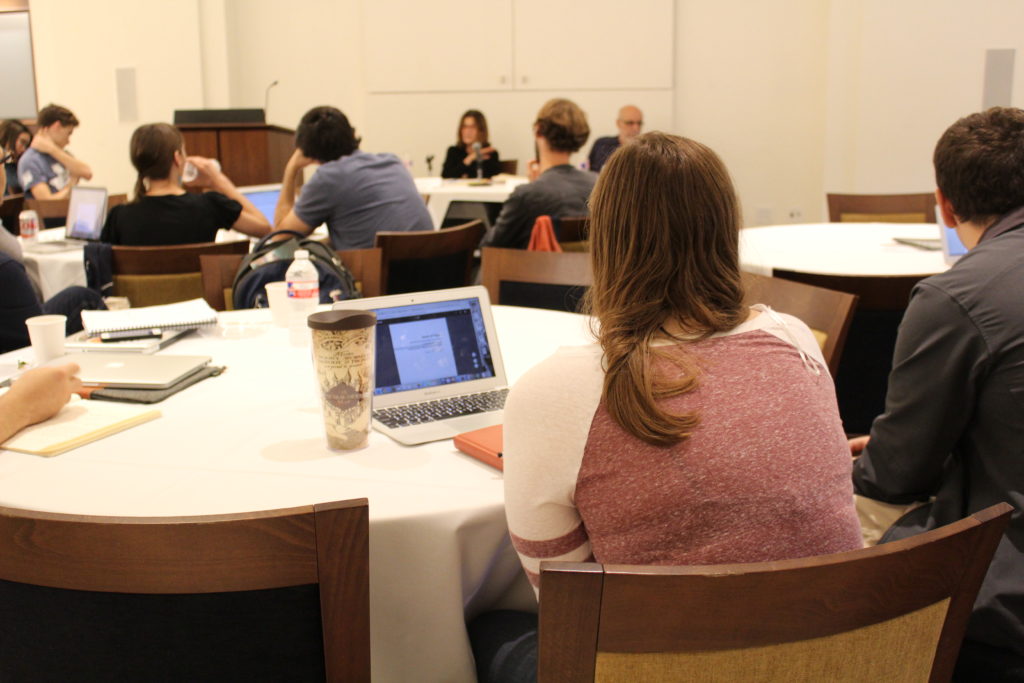
Using Ghana’s Oil Wealth to Promote Social Rights: A Vanishing Dream?
- Lucie E. White Louis A. Horvitz Professor of Law, Harvard Law School
- William E. Forbath Lloyd M. Bentsen Chair in Law & Associate Dean for Research, Texas Law
As part of our fall colloquium on natural resource governance, inequality and human rights, the Rapoport Center hosted a discussion entitled “Using Ghana’s Oil Wealth to promote Social Rights: A Vanishing Dream” with Lucie E. White (Louis A. Horvitz Professor of Law, Harvard Law School) and William E. Forbath (Associate Dean for Research & Lloyd M. Bensten Chair in Law at Texas Law).
White and Forbath have been collaborating on a project, together with civil society organizations and heterodox economists, to consider the implications of various trajectories and frameworks for developing Ghana’s recently discovered oil fields in order to best advance the realization of socio-economic rights. The project will culminate in a workshop in Accra, Ghana in January 2017, in which members of the Rapoport Center will also participate.
White explained how her interest in these issues arose out of her long-standing work with social and economic rights advocates in Ghana working with marginalized communities. She noted that the dominant socio-economic rights approaches are too narrow, in that they primarily focus on the local impacts of oil development on coastal communities, such as increased seaweed in the nets of fisherfolk and dead fish on their beaches. She worried that these communities are excluded from the broader policy debates where decisions about oil development and its trajectories are being made. White asked, “Is it plausible for people, like the ones I work with, to have any kind of meaningful engagement as subjects in these debates that they’re so excluded from? They have no idea that these debates are happening.”
White provided an overview of the debates around the development of oil wealth in Ghana and the underlying development paradigms which informed them. She identified five main theoretical frameworks or perspectives in the debates:
- a “neoliberal position” that is focused on collecting the rents from oil extraction, and using this money to pay off the national debt, thereby improving the country’s credit rating in order to attract more foreign direct investment to drive development;
- a “left liberal position” focused on using the money from the oil rents to directly fund social needs such as health, education, and infrastructure;
- a “nationalist position” that argues Ghana should “go it alone” and develop its own expertise so that it doesn’t have to rely on international corporations and their technical expertise;
- a “new developmental or hybrid position” that is focused on building oil infrastructure but also diversifying the economy simultaneously, and therefore using some of the oil rents to support other emerging promising industries in Ghana;
- finally there is an “environmentalist position” that argues that climate science makes it clear that the oil cannot be pumped if climate disaster is to be averted, and therefore calls on policy makers to “keep the oil in the ground” or at least to plan to phase oil extraction out over the short-term.
White initially favored the left liberal perspective of using the money “for social needs, for education, for healthcare.” This seemed like the obvious choice for human rights advocates, but she now recognizes that the issues are more complex than she originally anticipated and that there are many important critiques to take into consideration. She suggested that while human rights frameworks can provide important guidance on funding priorities, these issues involve complex decisions about development trajectories that go beyond traditional human rights concerns.
Her focus now is directed at how to bring communities affected by extraction into these discussion-making processes. “How is it that these decisions should be made? Should it be referendums? Should it be popular democracy and hoping for the best? Should it be parliamentary democracy, and how do you…bring local people into it? How do you [determine] the most positive human rights decision making structure?” Or, alternatively, “does it make the most sense to focus explicitly, and maybe even exclusively, on building a social movement that would simply create pressure to shape up the current political settlement?”
In his comments, Forbath agreed that there are no “positive human rights frameworks” that can guide these complex decisions. He reflected that questions such as “How will you improve Ghana’s wealth and do so in a way that will reliably make possible redistribution and broad distribution of that wealth” do not “seem to be human rights questions, even though human rights advocacy and mobilization and language and politics can put pressure on the questions” He further suggested that the challenges In ensuring that local political elites are not susceptible to capture by international oil companies and deepen their accountability to people at the periphery, were not unique to Ghana, but rather “endemic of liberal democracy”.
However, he too was optimistic that from increased discussion between people at the “center,” such as economists and lawyers, and affected communities and socio-economic rights advocates would “emerge new insights to make better use of the tool kit of human rights advocates.” He stressed that questions about how best to redistribute Ghana’s oil wealth and how to prevent the susceptibility of political elites to corruption and the so-called “resource curse” depended on questions on institutional design, more so than on human rights.
The conversation raised many questions from students and community members in the audience, around access to information on which such decisions could be made, how to address inequalities between the elites and affected communities in Ghana, as well as new forms of political mobilization necessary to democratize these processes and push for greater redistribution of oil wealth.
